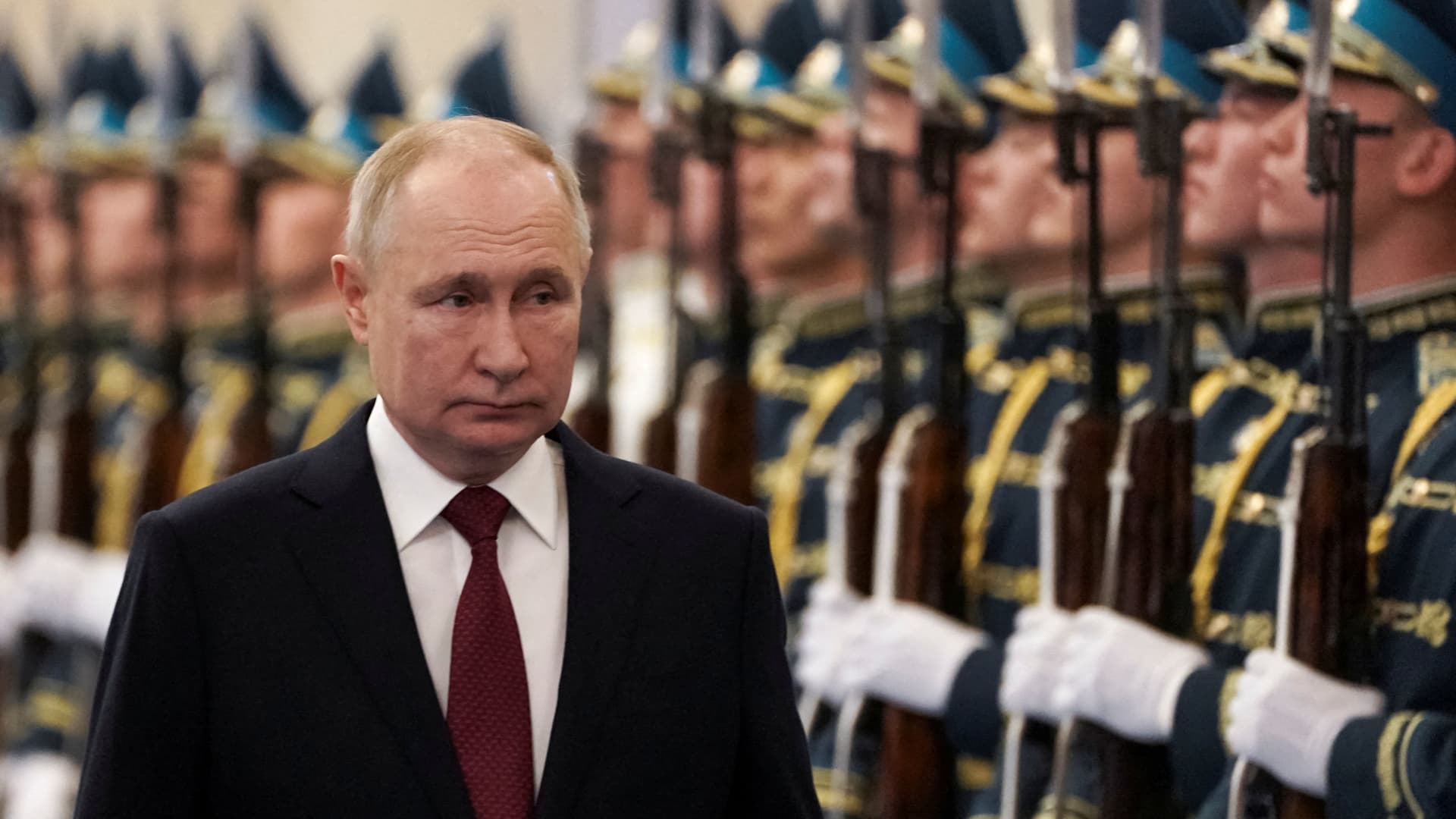Russian President Vladimir Putin speaks after signing bilateral documents with his Kazakh counterpart Kassym-Jomart Tokayev in Astana, Kazakhstan, on Nov. 9, 2023.
Turar Kazangapov | Reuters
France’s suggestion that Ukraine’s allies could potentially send ground troops into Ukraine has caused indignation and outrage in Russia, with officials warning that it could provoke a direct conflict between Russia and NATO member states.
Eyebrows were raised Monday when French President Emmanuel Macron suggested that European heads of state and Western officials, who met in Paris on Monday, had talked about the possibility of sending ground troops into Ukraine.
“There is no consensus today to officially, openly, and with endorsement, send troops on the ground. But in terms of dynamics, nothing should be ruled out. We will do everything necessary to ensure that Russia cannot win this war,” Macron said in a press conference Monday evening.
Moscow was quick to seize on the comments, with the Kremlin’s Press Secretary Dmitry Peskov telling reporters Tuesday that if European NATO members sent troops to fight in Ukraine it would make a conflict between Russia and NATO inevitable.
“In this case, we need to talk not about probability, but about inevitability, and that’s how we evaluate it,” he said, news agency TASS reported, when asked about the likelihood of a direct conflict between Russia and the Western military alliance if its troops crossed the border.
Peskov added that NATO countries “must also evaluate” the consequences of such actions and and “ask the question whether this corresponds to their interests, and most importantly, to the interests of the citizens of their countries.”
Russian Foreign Minister Sergei Lavrov also weighed in, advising any countries considering sending troops to Ukraine to “use their heads,” news agency TASS added.
“It seems to me that those who not only express such thoughts, but even admit them in their heads, should still use that head for more rational thoughts, [as it’s] safer for Europe,” Lavrov said at a press conference Tuesday.
European allies row back on the idea
European allies have been quick to play down the comments, with Germany issuing a hasty denial Tuesday that it had any plans to put “German troops on Ukrainian soil.” The U.K. and Spain also publicly rejected the idea, which would see troops from NATO member states in direct conflict with longtime nemesis and nuclear power Russia.
German Chancellor Olaf Scholz insisted there was no consensus on deploying ground troops among European leaders and officials from the U.K., Canada and U.S. who met in Paris on Monday.
“Once again, in a very good debate, it was discussed that what was agreed from the outset among ourselves and with each other also applies to the future, namely that there will be no ground troops, no soldiers on Ukrainian soil sent there by European countries or NATO states,” Scholz said on the sidelines of an event.
Germany’s Vice-Chancellor Robert Habeck also commented with “advice” for France, saying it would be more helpful for the country to send weaponry and tanks to Ukraine, Reuters reported. He likewise said that there would be “no German soldiers on Ukrainian soil.”
French President Emmanuel Macron welcomes Ukraine’s President Volodymyr Zelenskyy and German Chancellor Olaf Scholz for a meeting at the Elysee Palace in Paris, France, February 8, 2023.
Sarah Meyssonnier | Reuters
A spokesman for the U.K.’s Prime Minister Rishi Sunak said the country had no plans for a “large-scale” deployment of troops to Ukraine, separate from the small number of personnel that were already in the country to support Ukraine’s armed forces.
Madrid has also publicly refuted the notion, with government spokesperson Pilar Alegria saying Spain does not agree with a French proposal to send European ground troops to Ukraine. She added that Spain wanted to limit aid to sending more weapons and other materials to Kyiv.
“Unity has been and is the most effective weapon Europe has to face up against [Russian President Vladimir] Putin’s attack,” Alegria said, according to comments translated by Reuters.
Later Tuesday, NATO Secretary-General Jens Stoltenberg told the Associated Press news agency that NATO has no plans to send combat troops into Ukraine.
Stoltenberg said that “NATO allies are providing unprecedented support to Ukraine. We have done that since 2014 and stepped up after the full-scale invasion. But there are no plans for NATO combat troops on the ground in Ukraine.”
NATO membership obliges member states to commit to protect each other if any one of them is attacked. “Article 5 provides that if a NATO Ally is the victim of an armed attack, each and every other member of the Alliance will consider this act of violence as an armed attack against all members and will take the actions it deems necessary to assist the Ally attacked,” the group states.

